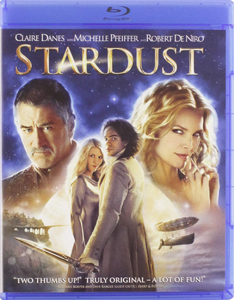“Stardust” (2007), adapted from a Neil Gaiman novel, is a slightly adult-leaning but still family friendly answer to the “Harry Potter” films that dominated the box office at this time. The source material came out the same year as the first “Potter” novel, so it’s not a ripoff, but it might’ve felt that way to some filmgoers.
Light sense of fun
Nonetheless, this fantasy adventure directed by Matthew Vaughn (“X-Men: First Class” and the “Kingsman” films), co-writing with Jane Goldman, has found a cult following. I’m not surprised, as it has a consistently light sense of fun. It always immediately undercuts its moments of violence, death or conflict.
For me, “Stardust” is a prime example of a movie that could’ve been great at 100 minutes. But because the creators can’t resist indulging in the world they’ve built, it’s instead merely an OK 127-minute film. Ian McKellan’s narration bookends the film, and by the end I had forgotten he had introduced the movie.

“Stardust” (2007)
Director: Matthew Vaughn
Writers: Jane Goldman, Matthew Vaughn (screenplay); Neil Gaiman (novel)
Stars: Charlie Cox, Claire Danes, Michelle Pfeiffer
Claire Danes, Michelle Pfeiffer and a pre-“Daredevil” Charlie Cox make “Stardust” as good as it can be. Fallen star Yvaine (Danes) and shop-boy dreamer Tristan (Cox) don’t have a ton of chemistry; I feel they are together because the screenplay says so.
Cox displays youthful enthusiasm. It’s cute how Yvaine glows as her love for Tristan burgeons, and Danes effortlessly sports a British accent. Pfeiffer has fun as witch Lamia wavers between her magical youthful look and her actual old-crone wrinkles.
Robert De Niro is capable of great stuff, of course, but sometimes he gets by on the novelty of him playing an unusual character – in this case a pirate captain who is effeminate behind closed doors. The captain’s biggest worry is that his reputation will be hurt. But there’s no reason to worry; nothing in this adventure is truly worthy of worry.
Nothing to worry about
To a point, I like that “Stardust” is never dark and grim. Whenever violence happens, it’s immediately undercut with comic relief. For example, one of the seven brothers competing for the vacant throne gets pushed to his death, then immediately pops up with the other brother ghosts, his face comically squished.
The downside is that the story is predictable and tame – Tristan aims to get back to his town, Wall, which is just outside the magic kingdom – and the big action scenes aren’t as appealing as the general light spirit. Lamia shooting green mist at people looks nice, but it’s kinda boring.
Granted, she has creative tricks up her sleeve, such as a voodoo doll that makes her enemy’s limbs break. (But again, in a merely OK movie, nothing is fun after the 2-hour mark.)

No culture clash
“Stardust” is missing a sense of grounding because it’s set in the past in a British village. When Tristan enters the magic kingdom, sure, there are rules he has to learn. But the language and even the culture are much the same. There’s no significant clash of worlds.
I’ve tried a few times to get into Gaiman’s work (“How to Talk to Girls at Parties” is certainly … unique) but I’m not on his wavelength. I’m also not into the purest forms of old-timey fantasy storytelling with kings and witches and whatnot.
I gave “Stardust” 127 minutes of my time, but it never delivered that something special to make it stand out.

